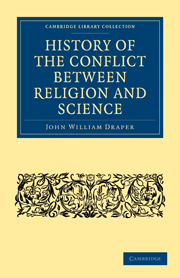Book contents
- Frontmatter
- Preface
- Contents
- CHAPTER I THE ORIGIN OF SCIENCE
- CHAPTER II THE ORIGIN OF CHRISTIANITY.—ITS TRANSFORMATION ON ATTAINING IMPERIAL POWER.—ITS RELATIONS TO SCIENCE
- CHAPTER III CONFLICT RESPECTING THE DOCTRINE OF THE UNITY OF GOD.—THE FIRST OR SOUTHERN REFORMATION
- CHAPTER IV THE RESTORATION OF SCIENCE IN THE SOUTH
- CHAPTER V CONFLICT RESPECTING THE NATURE OF THE SOUL.—DOCTRINE OF EMANATION AND ABSORPTION
- CHAPTER VI CONFLICT RESPECTING THE NATURE OF THE WORLD
- CHAPTER VII CONTROVERSY RESPECTING THE AGE OF THE EARTH
- CHAPTER VIII CONFLICT RESPECTING THE CRITERION OF TRUTH
- CHAPTER IX CONTROVERSY RESPECTING THE GOVERNMENT OF THE UNIVERSE
- CHAPTER X LATIN CHRISTIANITY IN RELATION TO MODERN CIVILIZATION
- CHAPTER XI SCIENCE IN RELATION TO MODERN CIVILIZATION
- CHAPTER XII THE IMPENDING CRISIS
- INDEX
CHAPTER X - LATIN CHRISTIANITY IN RELATION TO MODERN CIVILIZATION
Published online by Cambridge University Press: 29 August 2010
- Frontmatter
- Preface
- Contents
- CHAPTER I THE ORIGIN OF SCIENCE
- CHAPTER II THE ORIGIN OF CHRISTIANITY.—ITS TRANSFORMATION ON ATTAINING IMPERIAL POWER.—ITS RELATIONS TO SCIENCE
- CHAPTER III CONFLICT RESPECTING THE DOCTRINE OF THE UNITY OF GOD.—THE FIRST OR SOUTHERN REFORMATION
- CHAPTER IV THE RESTORATION OF SCIENCE IN THE SOUTH
- CHAPTER V CONFLICT RESPECTING THE NATURE OF THE SOUL.—DOCTRINE OF EMANATION AND ABSORPTION
- CHAPTER VI CONFLICT RESPECTING THE NATURE OF THE WORLD
- CHAPTER VII CONTROVERSY RESPECTING THE AGE OF THE EARTH
- CHAPTER VIII CONFLICT RESPECTING THE CRITERION OF TRUTH
- CHAPTER IX CONTROVERSY RESPECTING THE GOVERNMENT OF THE UNIVERSE
- CHAPTER X LATIN CHRISTIANITY IN RELATION TO MODERN CIVILIZATION
- CHAPTER XI SCIENCE IN RELATION TO MODERN CIVILIZATION
- CHAPTER XII THE IMPENDING CRISIS
- INDEX
Summary
For more than a thousand years Latin Christianity controlled the intelligence of Europe, and is responsible for the result.
That result is manifested by the condition of the city of Home at the Reformation, and by the condition of the Continent of Europe in domestic and social life.—European nations suffered under the coexistence of a dual government, a spiritual and a temporal.—They were immersed in ignorance, superstition, discomfort.—Explanation of the failure of Catholicism.—Political history of the papacy: it was transmuted from a spiritual confederacy into an absolute monarchy. —Action of the College of Cardinals and the Curia.—Demoralization that ensued from the necessity of raising large revenues.
The advantages accruing to Europe during the Catholic rule arose not from direct intention, but were incidental.
The general result is, that the political influence of Catholicism was prejudicial to modern civilization.
Latin Christianity is responsible for the condition and progress of Europe from the fourth to the sixteenth century. We have now to examine how it discharged its trust.
It will be convenient to limit to the case of Europe what has here to be presented, though, from the claim of the papacy to superhuman origin, and its demand for universal obedience, it should strictly be held to account for the condition of all mankind. Its inefficacy against the great and venerable religions of Southern and Eastern Asia would furnish an important and instructive theme for consideration, and lead us to the conclusion that it has impressed itself only where Roman imperial influences have prevailed; a political conclusion which, however, it contemptuously rejects.
- Type
- Chapter
- Information
- History of the Conflict between Religion and Science , pp. 255 - 285Publisher: Cambridge University PressPrint publication year: 2009First published in: 1875



